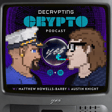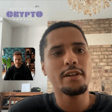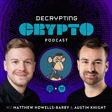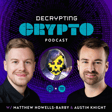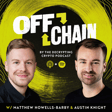Become a Creator today!Start creating today - Share your story with the world!
Start for free
00:00:00
00:00:01

Farming airdrops as a node operator with Sami & Theo from Noder
In case you didn't notice, it's airdrop season. Free money is raining down but airdrop farmers have to get smarter about how they're going to qualify for these juicy payouts.
We speak with Theo and Sami, the cofounders of Noder.bot which is a node-as-a-service platform focused on setting you up with pre-mainnet nodes. You don't need any technical knowledge and it's a simple one-click install. If you're exploring airdrops, you have to check this out.
Listeners can get early access to Noder.bot using code: decrypt
Transcript
Introduction of Podcast and Guests
00:00:12
Speaker
Hello and welcome to the Decrypting Crypto Podcast. I'm Matthew Housebarbie and today we've got
00:00:18
Speaker
a super interesting interview that we do with Theo and Sami, the co-founders of Noda, which is a Noda's a service offering.
Airdrop Controversies and Criteria
00:00:28
Speaker
And why are we chatting to these guys? Well, I've been down a bit of a rabbit hole recently because don't know if you've all noticed, there's been quite a lot of excitement around the crap ton of free money being shipped out in the form of airdrops and
00:00:47
Speaker
The most recent one that we saw was StarkNet. And if any of you have been following the StarkNet AirDrop, you'll know that there was a lot of people that were kind of upset. I mean, there's always people that are upset around AirDrops because they didn't either get enough, get it in time for when they wanted it, or the criteria through which the AirDrop was decided was not to their liking.
00:01:14
Speaker
And the situation with StarkNet was definitely the latter, where it was the criteria. What we're trying to see is, you know, I think what many blockchains and other protocols, those that are offering tokens in the form of air drops, are trying to do is they're trying to avoid civil attacks. So people that are just
00:01:34
Speaker
purely farming the airdrop, doing a few random transactions on the testnet chain from multiple wallets to just try and get as much as possible. Well, there's a couple of ways that they're combating this, right? And this isn't just startnet, this is an evolving theme that's happening.
00:01:53
Speaker
You've got added complexity to the criteria, so it's not just enough to be doing a few swaps. You have to have a certain amount of transactions over a certain number of unique months. It needs to hit certain volume requirements. You need to have participated on certain different apps or different protocols.
Role and Rewards of Testnet Node Operators
00:02:16
Speaker
uh you had to do some kind of like verification in some cases like stark net they set this kind of arbitrary thing where you at the time of the snapshot you needed i think it was 0.05 eth in your wallet which was kind of random but i think they're just trying to
00:02:34
Speaker
create these artificial barriers. So people are getting squeezed a lot, but there's one area where we're seeing more and more individuals getting rewarded pretty heavily for their participation in the early pre-mainnet era of a blockchain in the form of an airdrop.
00:02:55
Speaker
And that is testnet node operators. And this is where I kind of came across node, because I was looking at different ways. I'd been running a few testnet nodes playing around with this. And for context, right, when a new blockchain or new L2, whatever it is, is gearing up for launch, they'll launch on a testnet first. So they're pre-mainnet offerings. And often, they'll do a few different testnets.
00:03:21
Speaker
They'll do this to test functionality. They'll do this to kind of test how they handle higher volumes and just stress testing the system as a whole. To be able to do that, they need node operators. Node operators are the ones that, you know, process, validate transactions in the same way that like operators on the main net operate.
00:03:44
Speaker
The problem is if you're a node operator on a testnet, you're not getting rewarded with like staking rewards or otherwise like an eth validator would right now. Cause it's all testnets, all kind of just play money, right? And so what started to happen is there needs to be some kind of incentive for these node operators, especially when you need tens of thousands in some cases, even more.
Simplifying Node Operations with Noda
00:04:10
Speaker
there needs to be a way. So the promise is often, and they'll often be called like an incentivized testnet, right? So which many, many chains have done. And what they'll then want to do is reward these node operators for going out of their way to run a node, no real incentive to them or no monetary benefit in the short term.
00:04:33
Speaker
Running a node is not easy though in many cases, right? You have to like run your own hardware. You have to run a bunch of like complicated programs that don't have like simple to use graphical interfaces. I would say I'm quite technical and I definitely get lost in this. Like I've run
00:04:53
Speaker
either validators on the mainnet and then I go to like some of these other like testnet validators and I have no idea what I'm doing. So this is where I was kind of personally looking for a solution and how I kind of came to Jan into Theo and Sammy because they just launched a
00:05:11
Speaker
new platform called Noda which effectively just takes all of the the hard work out of it and almost is just like kind of like a software as a service really it's just like a one click it literally almost was one click and you're up and running they've managed everything in the background and you just pay a subscription fee
00:05:31
Speaker
It's pretty awesome. There are other competitors here. I just want to say also zero affiliation to Notre. I just really wanted to get someone in from the space that's building so that we could chat to them and break this
Motivation Behind Noda's Creation
00:05:41
Speaker
down. But before we get into the interview, I think the key here for me is that
00:05:48
Speaker
The, with with nodar and and others I think what they're really tapping into here is probably the biggest opportunity when it comes to airdrop farming, much more so than kind of more on like the retail side where you know you're just doing a few transactions and things like that so
00:06:06
Speaker
Super exciting. I think this is going to be an area that's going to be talked about a lot. So kind of being early in this space will pay off dividends and there's a whole host of areas that you can play around in. And if you're kind of like me, it's just another excuse to play around one layer deeper and more the infrastructure that's powering a lot of blockchains, which, you know, maybe I'm just a bit nerdy here, but I find it quite fun.
00:06:27
Speaker
So, Noda is actually, is closed to customers right now, but they have been super kind and they're offering everyone on, that's our listeners, the opportunity to be able to go in and pay for a node with a special code that we'll share at the end of the podcast. So stay tuned for that, right? Let's jump straight in.
00:07:01
Speaker
Theo, Sammy, welcome to the podcast. I really appreciate you guys coming on on what is kind of becoming a more and more talked about topic, but I think not a lot of people still that are in and surrounding crypto are that familiar with.
00:07:17
Speaker
You are both the co-founders of Noda and I think it's a super exciting project that you've built out. And I know it's very much in its early stages right now, but there's a lot of excitement around what you guys are doing and generally this space. So why don't we just kick things off with you guys giving a bit of a high level explainer of what Noda is and I guess even like why you guys decided to build it in the first place.
00:07:41
Speaker
All right. Well, first of all, thank you for giving us this opportunity to actually come up and talk about what we're building here.
Noda's Approach to Affordable Node Management
00:07:48
Speaker
And a little bit of how Noter was born is the team behind it, basically me and Theo. We've been running nodes for quite a while. And what we've noticed mainly is that the public knowledge about nodes is quite close to zero. And most of the projects use that to their advantage to charge crazy amounts for, you know, monthly for a node going like $400, $500, sort of making node usage for the elite. And this is where we wanted to intervene. Our main goals are mainly affordability and simplicity.
00:08:16
Speaker
in how we managed to do both of these. Well, the first one, affordable, is we are owned and backed by a Web2 service infrastructure that is called Xenenhost. So they're offering us their servers, and that's how we can play with the margin of prices. As for the simplicity is that we've automated the whole process, and it's literally just three clicks for the users, and his node will be up and running. On our own hardware, we handle any technical issues on our side.
00:08:42
Speaker
And that's pretty much it, yeah. Why don't we even start like even one level back in terms of explaining a little bit around like what a node actually
Understanding Nodes and Their Importance
00:08:52
Speaker
is. For many of like the listeners, they'll be familiar with much of crypto. I think this is kind of where we get one level deeper from being
00:09:01
Speaker
a holder of tokens and participating in crypto as a whole and then getting maybe one click down into like the infrastructure layer so i wonder if either theo or something you can just give like a high level on what a node is used for uh typically and and and how someone who hasn't maybe had that experience if you've ever running a node before can understand what what its use case is
00:09:26
Speaker
Okay, so generally a node is usually just a server that maintains a copy of the entire blockchain from the genesis block which is block zero which is where the chain starts all the way to the current latest blocks and all of these blockchain networks are consisted of these individual peer-to-peer networks of nodes and these nodes are responsible for propagating and validating transactions
00:09:49
Speaker
creating and executing smart contracts, and in general, just maintaining the state of the entire blockchain. Now to communicate with each other to propose, propagate and verify transactions across different networks. And when you send a transaction, the transaction is being sent to the network via an RPC, which is what your wallet is actually doing.
Challenges of Manual Node Operation
00:10:11
Speaker
Right. So effectively, you know, nodes are really what makes kind of the blockchain go round, right? Like without, without them,
00:10:19
Speaker
none of the transactions are actually going to be validated, executed. Like this is what's powering blockchains. And I think for a lot of people, you know, it's kind of behind the scenes stuff. And could you explain a little bit, obviously, you guys are clearly very technical, you've built out a service that
00:10:41
Speaker
ultimately abstracts away a lot of the complexities that come with actually running a node yourself. But what does that process look like? Actually, if someone were gonna be actually running a whole node themselves, what does it entail?
00:10:58
Speaker
It really depends on what network you're trying to run the node on. But for most L2s, you would usually just be using a client, which is usually called GEVE, which is the most commonly used one. But essentially, it's this console line based program, which is, it doesn't have any graphical interface. It does not have any UI, which is why we decided to create our own dashboard to simplify everything for people.
00:11:27
Speaker
Right. And for a lot of people as well, right? They're like running their own hardware and stuff like that, which to begin with in many cases is like something that puts off a lot of people.
Focus on Testnets and Community Benefits
00:11:40
Speaker
Um, I, I noticed something in particular where, when Noda seems to be focused, I know it's still in the very early stages and we can talk a little bit about what specifically you guys are offering there, but the, um,
00:11:53
Speaker
It seems to be that you're quite focused on test nets right now and running nodes on test nets. Can you explain why that's the case and why that's actually important in the first place?
00:12:06
Speaker
Even more specifically, we actually target chains that have not actually launched mainnet yet. And essentially it's because a lot of the community, if there's no financial incentive, they have no interest in running a node. And usually these pre-mainnet chains, if you're running a testnet node, you're essentially helping them and building a network which helps them continue to develop the chain. And essentially what they do is they generally airdrop
00:12:35
Speaker
uh all node operators on testnet when they launch mainnet with insane amounts which is why we're trying to target well it seems like then you know you've got this this interesting part i mean everyone in crypto it loves air drops myself included we we all enjoy that part uh and and i think yeah this it seems like there's this shift right now in
00:13:03
Speaker
First of all, the way that a lot of the larger airdrops are being decided from a criteria perspective, they're getting more and more difficult to gain. I mean, go back to like the last bull cycle. And prior to that, it was basically, you know, do a few swaps on the network and you you've got a nice big kind of a stimmy coming your way.
00:13:25
Speaker
But like you mentioned, now all of these pre-mainnet chains before they go live, they really need these node operators to really test the scale out and do a lot of testing here. And they're rewarding a lot of these. Do you feel like this is a trend that
00:13:44
Speaker
we're gonna see continue to feel like that more protocols, more chains are going to reward these node operators more so than just, you know, I guess the people farming via swaps and stuff like that.
00:14:00
Speaker
I think we're talking about completely two different types of groups. One groups are focused on general retail use, which would be your swaps and those airdrop farming. But running nodes would be on an infrastructure level, which is also why they generally give larger airdrops.
00:14:20
Speaker
It's a very different target we're talking about.
Noda's Target Audience and Security Solutions
00:14:24
Speaker
So why would you say someone would kind of use a service like Noda versus just running kind of your own hardware and going through this yourself? Is there any downside, upside to this?
00:14:40
Speaker
Generally, people use services like Nodir because they just simply don't have the technical expertise. And because we've created this absolutely simplified platform where you can create everything with just a few clicks, this allows a lot more people to actually get into that infrastructure side instead of just staying on testnets, just clicking other things that are already built on the chain. Swaps are pretty much just useless. If you're doing a swap on the testnet,
00:15:10
Speaker
it's not doing much except for ticking that box on the chart, which has a potential to give you an airdrop. But as everyone starts to do that, you realistically are not going to be getting anything. And are there any tests? Because I mean, I before I reached out to you guys, I was like, look, I'm looking at this space, it feels like there's a lot of interesting stuff. And I was searching for
00:15:34
Speaker
companies like yourselves that are making this process simple. And I tested out, you guys let me kind of test out some of the early kind of services that you've offered. And I think you've got one service up right now where you can run a note on the Tyco network.
00:15:53
Speaker
I'm curious as to how you think about which nodes you want to kind of create offerings around and if there's anything on the roadmap for the future. Because it feels like, you know, you go into Discord and people are asking for every single kind of like chain under the sun. How are you thinking about deciding on which ones you're going to create an offering around?
00:16:18
Speaker
There's many aspects to that, but mainly we're focusing on two things. One is the feasibility of automation, because some chains simply cannot be automated because there's too many steps that you have to do manually.
00:16:31
Speaker
But there are also other chains which you can completely automate like Tyco. It was one of the key reasons we chose it. The second part is community. People like that chain. People support the chain. People want that concept behind that chain, which is another key aspect when you're deciding which chain to farm because if there's no community to support it, even if you run infrastructure, it's useless.
00:16:57
Speaker
Yeah, it's a good point. And so I guess then really you're looking for kind of the scale of the community, the potential of it. And also, I guess just at a basic level, like how, how feasible is it to, to actually automate a lot of this, this process? Do you see you guys actually like offering more than, than, than Taika right now, or are you trying to just like double down on that initial offering and start kind of building out more in the future?
00:17:25
Speaker
We've actually already finished Automations for four other new chains, and that includes Fueled Network, Zora, and X1 by OKX, and the final one's Linear, which is already live through many of our partners. Oh, that's awesome. And so, for people...
00:17:44
Speaker
So there's probably two questions that I imagine will come up a lot for you guys. The first being, you know, how much does it cost and how do you like think about pricing? And so maybe we can tackle that. The next one, which I think is the most pressing kind of piece is around, you know, if you're running your own node, you are setting everything up yourself, you own
00:18:10
Speaker
you know, your own keys, it's linked to your wallet, et cetera, if that's how the node operates. Like, did Noda customers still own their own keys? Like, do you own the keys? How does this kind of process work?
00:18:24
Speaker
OK, I'll answer that for you. So first of all, about the keys. Our customers fully own their keys. All we ask for is really just the public address of your wallet that you will input as the fear recipient yourself on our website, which will be tagged to your node, meaning that when a testnet wants to take a snapshot, for example, for the people that they want to reward, this is the wallet that they see. So we do not ask for private keys. You fully own your wallet, and the airdrop goes directly from the testnet into your wallet.
00:18:53
Speaker
As for the pricing, it's pretty much different from a testnet to another because the specs are different. For example, we have the Twitter for the live right now. We've got Tyco and Linea. Tyco is about at $69 per month. You've set one for yourself and you've gone through the process. Linea spec requirements are about 1.5 of those for Tyco. So we've pressed it at $99 a month. And the three that Theo talked about that are coming in March, again, the pricing is also different. It really depends on the specs that are required.
00:19:23
Speaker
Got it. And I've seen, you know, I was looking, because it feels like Noda are not the only ones that are starting to kind of build out offerings similar to this. But one thing I, I think the thing that interests me because I've been testing out a few of these other ones, which I won't name a bunch of competitors, right? But like,
00:19:43
Speaker
I, the thing that I did notice, the thing that varied the most is around key ownership that there was like one of the offerings I saw where they basically, you know, they owned the private key, they shared the private key with you and then supposedly deleted it from their systems, which doesn't leave me feeling super confident. Uh, I wonder if you could even just talk about like the pros and cons of some of that for, for people that are trying to understand like why that's even important.
00:20:11
Speaker
I mean, if someone has your private key, he basically has full control of your wallet, right? I personally would not give my private key to anyone. And we know that people do hesitate to rent nodes because of that aspect. So we also wanted to do something about it. I wouldn't run nodes with a company that would want to take my private key because you never know what could happen.
00:20:34
Speaker
That's pretty much also an aspect, as I told you, that we wanted to allow people to still get the airdrops from Node running because they do tend to be the largest. And TL has found a way to automate it through the process of just putting your wallet address and then the testnet teasers at the fear recipient. So when they take a snapshot, they do see your wallet that is linked to the Node, which is running the proposals, for example. Interesting. Yeah. And I feel like that
00:21:04
Speaker
that's what most people are going to feel comfortable with. I mean, it was literally just, you know, connect my wallet, pay, and it's all paid in crypto, right? And then you're up and running. And it's pretty much as hands off as you can imagine. I guess for you guys, you know, what's
00:21:21
Speaker
You began with this initial offering. You've got the two node offerings up now, and I think you're still in somewhat of like a closed, I don't want to call it a beta, but like you're not completely open for like customers right now to scale.
00:21:36
Speaker
you're going to be offering some of these new chains as
Noda's Expansion to Mainnet Nodes
00:21:40
Speaker
well. And it feels like as we've now started to really enter in much more pleasant bullish market conditions, we'll see a whole host of new chains launching. So I'm sure there's going to be more there. But what's next for you guys at Noda? And what do you see as kind of the biggest opportunity coming up for people who are just interested as well in like running nodes themselves?
00:22:04
Speaker
So for what we want to do in the upcoming months, we've got planned for Q2, we're going to start running mainnet nodes, especially RPC nodes. These are the nodes people use to bot NFTs, bot transactions, and essentially it just allows them to send our transactions faster. And this is one of the main things we're trying to do because that's another market within the infrastructure area of blockspace that just completely
00:22:33
Speaker
is a monopoly at the moment. And that monopoly, they're charging absolutely insane prices. And I do think we can change that.
00:22:41
Speaker
And what's the for, I guess, kind of the somewhat layman here? Like what would you say is the biggest differentiator in running one of the kind of like main net RPC nodes versus one of the pre-main net nodes that you have in your offering right now? What's kind of the upside for the actual node operator? Why would someone want to do that? Mainnet nodes are used for
00:23:10
Speaker
institutions and individuals that want to get the transaction sent out as fast as physically possible. And that's the main use of them. So RPC providers don't get paid at all because they are not validating any blocks. They're just proposing these transactions, essentially. And pre-mainnet nodes, usually we run full nodes, which would include this validation process.
00:23:34
Speaker
and you would actually get rewarded on mainland. It's two completely different uses, but they're still revolving around blockchain nodes.
00:23:43
Speaker
So one really is for more of like the institutional audience that may want to have like some of these like RPC nodes that they're using. And then you've got kind of the mainnet validator nodes, which is more akin to what most people would be familiar with with like proof of stake chains where they'll earn a like staking rewards, for example. Is that correct? Yes, that is.
Conclusion and How to Learn More About Noda
00:24:09
Speaker
All right, well, this is, yeah, this is super interesting. So, I mean, it feels like this is going to be a continued area where we're seeing more and more of the new chains and projects that are coming out pre-mainnet. There's such a huge amount of incentivization that's going in to running some of these nodes on their testnets. It feels like there's only going to be a huge amount of demand coming out more, which
00:24:37
Speaker
seems like you guys are very nicely placed to provide a service around WET.
00:24:43
Speaker
For anyone listening here, right, they're interested, where can they learn a little bit more about NodeR and how can they kind of like play around and test stuff out? Most easily, they can find us on Twitter at NodeRbot, and then they could join our Discord. We do have a full category that is just based on educational content to direct them both about node running and how NodeR works. If they just want to get a head start on, you know, general knowledge about nodes.
00:25:11
Speaker
That can be fun on there. And that's pretty much it. Yeah. Perfect. Well, that's great. Well, guys, this has been, this has been very educational. Um, and, and I'm sure over the next kind of weeks and months, there's going to be a bunch that, um, that, that we'll be able to see you guys offering, but, um, yeah, all the best with node and we'll be, we'll be keeping a close eye on how the space develops, especially as we start to see more of these test nets going into main net, which I'm sure everyone's excited about.
00:25:43
Speaker
The guys at NODA have been kind enough to offer access to all of our listeners through to NODA. You need a special code that they've pulled together just for listeners of the podcast. So if you go to NODA, N-O-D-E-R dot bot, and then when you go through the process, you can add the code decrypt. That's all lowercase decrypt. You'll be able to get in, get access and buy a subscription to one of their nodes today. Enjoy.
00:26:34
Speaker
The contents of the Decrypting Crypto podcast should not be used and are not intended as investment advice. Please do your own due diligence before making any investment, cryptocurrency or otherwise.
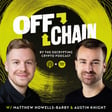
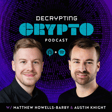
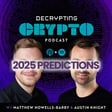
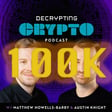
![CBDCs: The [Dark] Future of Money (Part 2 of 2) image](https://media.zencastr.com/cdn-cgi/image/width=112,quality=85/image-files/61fc0461fb20e00040aeb09e/5b9f1396-2a8e-418d-82a0-30fd00969266.jpg)

